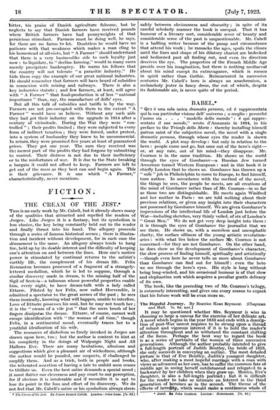BABEL.*
" Qui 6 una sola unica dramatis persona, ed é rappresentata qui la sun particolar visione dell' universo ; o meglio : perocche
l'uomo sin . . . modello dello mondo ' : 6 qui rappre-
sentato ii suo mondo," wrote d'Annunzio in 1894, in his preface to the Trionfo della Morte : thereby installing himself patron saint of the subjective novel, the novel with a single dramatis persona, through whose eyes the reader is shown the world. A plot may develop : but only in relation to the hero : people come and go, but once out of the hero's sight—
or, at any rate, out of his mind—they disappear. Mr. Cournos is in the same tradition. He shows us the world
through the eyes of Gombarov—a Russian Jew turned American turned Western European : and in this book it is chiefly London that he shows us. Gombarov has thrown up a "safe " job in Philadelphia to come to Europe, to find himself, turn author. In accordance with the method of the novel,
the things he sees, the people he meets, are all creations of the mind of Gombarov rather than of Mr. Cournos—in so far as those two are distinguishable. He meets again Winifred and her mother in Paris : we are told nothing about their previous relations, or given any insight into their characters not possessed by Gombarov himself. We are given Gombarov's impressions of the intellectual life of London just before the War—including sketches, very thinly veiled, of six of London's "Great Men." We do not get very deep insight into them : it is through the eyes of Gombarov the journalist that we see them. He shows us, with a merciless and unemphatic clarity, the surface silliness of the young artistic revolution- aries : with what lies below the surface Mr. Cournos is not concerned—for they are not Gombarov. On the other hand, he does show us the development of Gombarov's character, the slow process of finding himself, spiritually and artistically —though even here he never tells us more about Gombarov than Gombarov can find out for himself : even the hero we see through the hero's eyes. His style is long without being long-winded, and his occasional humour is of that slow and elephantine sort which acquires a peculiar gentle delicacy of its own.
The book, like the preceding two of Mr. Cournos's trilogy, is extremely interesting, and gives one every reason to expect that his future work will be even More so.














































 Previous page
Previous page